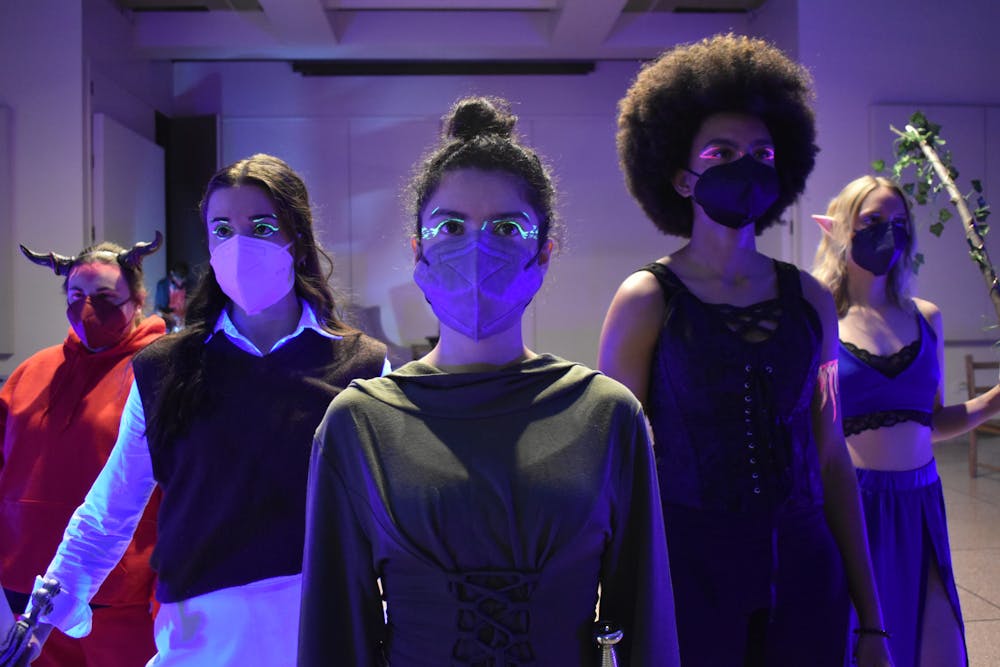The Barnstormers presented the 2022 intersession show, She Kills Monsters, a humorous yet touching exploration of death, family and societal expectations, over the weekend of Feb. 18 – Feb. 20.
She Kills Monsters, a work by the famous playwright Qui Nguyen, revolves around the life of Agnes Evans (senior Sandy Clancy), a thoroughly average young woman with a regular life as a high school English teacher and a stable-but-getting-stale relationship with Miles (senior Zach Galvarro). But her life suddenly changes when she loses her sister Tilly in a car crash. The two of them had never really been very close with each other: Tilly was younger and obsessed with geek culture, especially roleplaying games like Dungeons & Dragons. Agnes was much more of a “regular” girl and never really got into Tilly’s interests until she died.
While trying to clean up Tilly’s room, Agnes finds a game of Dungeons & Dragons with a storyline that Tilly had written herself. In order to play the game, she recruits one of Tilly’s friends Chuck (freshman Ander Diez) to be the dungeon master. The goal of the game is for Agnes, accompanied by her sister and her crew as characters in the game, to defeat various evil bosses until she can reach the final boss, in order to bring back the soul of her sister.
While Agnes initially thinks that the game doesn’t make any sense, she becomes more and more embroiled as she starts to learn more about Tilly and her life as they keep playing, and lines between fiction and reality blur as she begins to think she will actually bring Tilly’s soul back. On stage, this is represented by Tilly – going by her alter ego Tillius the Paladin – and the rest of the characters in the game being represented by actual actors rather than as characters to be imagined. Agnes learns that Tillius the Paladin and her group of mythical heroes — Lillith (senior Tara Desporte), Kaliope (Peabody Institute graduate student Katie Hahn) and Orcus (graduate student Melissa Shohet) — are all based on Tilly’s friends from real life.
As the game progresses, Agnes learns that Tilly was actually a lesbian, something that the two of them had never spoken about when she was alive. She then starts to find her real-life friends to try to unearth whether what the game said was true, but, being their high school teacher and grief-stricken, she ends up intimidating them rather than actually learning anything. Meanwhile, her relationship with Miles starts getting strained, too, as she learns that Tilly never liked him and because she doesn’t tell him about the Dungeons & Dragons game that has overtaken her life. Even Vera (junior Darcy Trinco), who is the high school counselor and Agnes’ best friend, can’t understand Agnes’ new obsession.
Tensions rise, both in real life and in the game, as Agnes finally comes to terms with the fact that the game will never be able to truly reunite her with her sister and that the closure she needs has to come from herself. In a rare moment of clearheadedness from a nerdy teenage boy, Chuck brings Agnes to the house where Tilly’s friends get together to play Dungeons & Dragons, where she finally learns that the character Lillith from the video game was actually a girl called Lily who had been Tilly’s best friend. The two had even kissed, but Lily was still in the closet and unsure about her sexuality. But this final closure allows Agnes to end the game, get back together with Miles and pursue a more meaningful life.
According to Peabody junior and director Caroline Colvin, the story is “an ode to the outcasts, those who — for a variety of reasons — have struggled finding belonging... Each character has endured their own form of alienation.” Dungeons & Dragons has become a “collective hobby that forges community for the community-less.”
Even Agnes, who had always lived a life that stayed away from these marginalized, geeky subcultures, found a way to achieve some sort of connection with her sister, finding community and family in a way that was at first bizarre for her but once familiar for Tilly. The play itself also made uses of techniques that went beyond that of a traditional play, particularly with its use of visual media in parts of the play. It showed early parts of Agnes and Tilly’s life through cartoons on a screen as well as maps of their Dungeons & Dragons games.
Overall, She Kills Monsters was an empathetic and tearjerking yet quite funny and eccentric representation of how to cope with grief and how teenagers and their families struggle with how they represent and accept their identities.

















